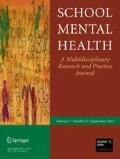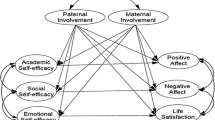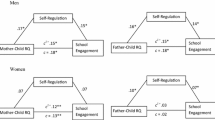Abstract
Relatively few studies have examined the mechanisms through which psychological control creates impairments in the scholastic and academic areas of children’s and adolescents’ functioning. The purpose of this study was to highlight the relation between psychological control and learned helplessness (LH), and also to test school self-efficacy as a mediator in the relation between psychological control and LH. A total of 186 students (103 males and 83 females) aged between 14 and 18 (M = 16.22, SD = 1.21) completed self-report questionnaires assessing socio-demographic characteristics, parental psychological control, school self-efficacy, and LH. Both maternal and paternal psychological controls were negatively associated with self-efficacy and positively associated with LH. This statement is consistent with our hypotheses. Furthermore, structural equation modeling showed that school self-efficacy was a full mediator in the relation between perceptions of parental psychological control and LH. These results extend previous studies on parental psychological control in a school context and provide evidence for the relation with LH, identifying self-efficacy as a variable that accounts for the relation between parental psychological control and LH.

Similar content being viewed by others
References
Abramson, L. Y., Metalsky, G. I., & Alloy, L. B. (1989). Hopelessness depression: A theory-based subtype of depression. Psychological Review, 96, 358–372.
Abramson, L. Y., Seligman, M. E. P., & Teasdale, J. D. (1978). Learned helplessness in humans: Critique and reformulation. Journal of Abnormal Psychology, 87, 49–74.
Achenbach, T. M., McConaughy, S. H., & Howell, C. T. (1987). Child/adolescent behavioral and emotional problems: Implications of cross-informant correlations for situational specificity. Psychological Bulletin, 101, 213–232.
Ahmad, I., Vansteenkiste, M., & Soenens, B. (2013). The relations of Arab Jordanian adolescents’ perceived maternal parenting to teacher-rated adjustment and problems: The intervening role of perceived need satisfaction. Developmental Psychology, 49, 177–183.
Alloy, L. B., Abramson, L. Y., Tashman, N. A., Berrebbi, D. S., Hogan, M. E., Whitehouse, W. G., et al. (2001). Developmental origins of cognitive vulnerability to depression: Parenting, cognitive, and inferential feedback styles of the parents of individuals at high and low cognitive risk for depression. Cognitive Therapy and Research, 25, 397–423.
Alloy, L. B., Kelly, K. A., Mineka, S., & Clements, C. M. (1990). Comorbidity in anxiety and depressive disorders: A helplessness/hopelessness perspective. In J. D. Maser & C. R. Cloninger (Eds.), Comorbidity in anxiety and mood disorders (pp. 499–544). Washington, DC: American Psychiatric Press.
Ames, C. (1990). Motivation: What teachers need to know. The Teachers College Record, 91, 409–421.
Assor, A., Roth, G., & Deci, E. L. (2004). The emotional costs of parents’ conditional regard: A self-determination theory analysis. Journal of Personality, 72, 47–88.
Aunola, K., & Nurmi, J. E. (2004). Maternal affection moderates the impact of psychological control on a child’s mathematical performance. Developmental Psychology, 40, 965–978.
Bandura, A. (1997). Self-efficacy: The exercise of control. New York: W.H. Freeman & Company.
Barber, B. K. (1996). Parental psychological control: Revisiting a neglected construct. Child Development, 67, 3296–3319.
Barber, B. K., Bean, R. L., & Erickson, L. D. (2002). Expanding the study and understanding of psychological control. In B. K. Barber (Ed.), Intrusive parenting: How psychological control affects children and adolescents (pp. 263–289). Washington, DC: American Psychological Association.
Barber, B. K., & Harmon, E. L. (2002). Violating the self: Parental psychological control of children and adolescents. In B. K. Barber (Ed.), Intrusive parenting: How psychological control affects children and adolescents (pp. 15–52). Washington, DC: American Psychological Association.
Barber, B. K., Stolz, H. E., & Olsen, J. A. (2005). Parental support, psychological control, and behavioral control: Assessing relevance across time, method, and culture. Monographs of the Society for Research in Child Development, 70(4), 1–137.
Baron, R. M., & Kenny, D. A. (1986). The moderator–mediator variable distinction in social psychological research: Conceptual, strategic, and statistical considerations. Journal of Personality and Social Psychology, 51, 117–1182.
Bean, R. A., Bush, K. R., McKenry, P. C., & Wilson, S. M. (2003). The impact of parental support, behavioral control, and psychological control on the academic achievement and self-esteem of African American and European American adolescents. Journal of Adolescent Research, 18, 523–541.
Bollen, K. A. (2002). Latent variables in psychology and the social sciences. Annual Review of Psychology, 53(1), 605–634.
Caprara, G. V., Fida, R., Vecchione, M., Del Bove, G., Vecchio, G. M., Barbaranelli, C., & Bandura, A. (2008). Longitudinal analysis of the role of perceived self-efficacy for self-regulated learning in academic continuance and achievement. Journal of Educational Psychology, 100, 525–534.
Chaffin, M., Silovsky, J., Funderburk, B., Valle, L. A., Brestan, E. V., Balachova, T., Jackson, S., Lensgraf, J., & Bonner, B. L. (2004). Parent–child interaction therapy with physically abusive parents: Efficacy for reducing future abuse reports. Journal of Consulting and Clinical Psychology, 72, 491–499.
Coffman, D. L., & MacCallum, R. C. (2005). Using parcels to convert path analysis models into latent variable models. Multivariate Behavioral Research, 40, 235–259.
Cole, D. A., & Turner, J. E, Jr. (1993). Models of cognitive mediation and moderation in child depression. Journal of Abnormal Psychology, 102, 271–281.
Cole, D. A., Warren, D. E., Dallaire, D. H., Lagrange, B., Travis, R., & Ciesla, J. A. (2007). Early predictors of helpless thoughts and behaviors in children: Developmental precursors to depressive cognitions. Clinical Child Psychology and Psychiatry, 12, 295–312.
Conger, K. J., Conger, R. D., & Scaramella, L. V. (1997). Parents, siblings, psychological control, and adolescent adjustment. Journal of Adolescent Research, 12, 113–138.
Copping, V. E., Warling, D. L., Benner, D. G., & Woodside, D. W. (2001). A child trauma treatment pilot study. Journal of Child and Family Studies, 10, 467–475.
Costa, S., Gugliandolo, M. C., Barberis, N., & Larcan, R. (2014a). The mediational role of psychological basic needs in the relation between conception of god and psychological outcomes. Journal of Religion and Health,. doi:10.1007/s10943-014-9956-6.
Costa, S., Hausenblas, H. A., Oliva, P., Cuzzocrea, F., & Larcan, R. (2014b). Perceived parental psychological control and exercise dependence symptoms in competitive athletes. International Journal of Mental Health and Addiction,. doi:10.1007/s11469-014-9512-3.
Costa, S., Soenens, B., Gugliandolo, M. C., Cuzzocrea, F., & Larcan, R. (2014c). The mediating role of experiences of need satisfaction in associations between parental psychological control and internalizing problems: A study among Italian college students. Journal of Child and Family Studies,. doi:10.1007/s10826-014-9919-2.
Donenberg, G. R., & Weisz, J. R. (1998). Guilt and abnormal aspects of parent–child interactions. In J. Bybee (Ed.), Guilt and children (pp. 245–267). San Diego, CA: Academic.
Dweck, C. S. (1975). The role of expectations and attributions in the alleviation of learned helplessness. Journal of Personality and Social Psychology, 31, 674–685.
Dweck, C. S., & Reppucci, N. D. (1973). Learned helplessness and reinforcement responsibility in children. Journal of Personality and Social Psychology, 25(1), 109.
Filippello, P., Harrington, N., Buzzai, C., Sorrenti, L., & Costa, S. (2014a). The relationship between frustration intolerance, unhealthy emotions, and assertive behaviour in Italian students. Journal of Rational-Emotive & Cognitive-Behavior Therapy, 32, 257–278.
Filippello, P., & Sorrenti, L. (2008). La Learned Helplessness [The learned helplessness]. In P. Filippello (Ed.), Valutazione e trattamento dei disturbi del comportamento. Interventi Cognitivo-Comportamentali in ambito scolastico e familiare [Assessment and treatment of behavioral disorders. Cognitive-Behavioral Interventions in schools and family] (pp. 27–80). Padova: Piccin.
Filippello, P., Sorrenti, L., Cuzzocrea, F., Nuzzaci, A., & Larcan, R. (2014b). The subtle sound of learning: What are the roles of the self-esteem, decision-making, and social skills in adolescents’ academic performance? US–China Education Review B, 4, 73–85.
Filippello, P., Sorrenti, L., Larcan, R., & Rizzo, A. (2013). Academic underachievement, self-esteem and self-efficacy in decision making. Mediterranean Journal of Clinical Psychology, 3, 1–11.
Filippello, P., Sorrenti, L., & Rizzo, A. (2011). Come compio le mie scelte: il decision making in soggetti con alto e basso rendimento scolastico [As I make my choices: Decision making in subjects with high and low academic achievement]. Psicologia Scolastica [School Psychology], 10, 195–221.
Filippello, P., Sorrenti, L., & Rizzo, A. (2012). Decision making e intelligenza emotiva in soggetti con alto e basso rendimento scolastico [Decision making and emotional intelligence in subjects with high and low academic achievement]. Life Span and Disability/Ciclo Evolutivo e Disabilità, 15, 125–161.
Fincham, F. D., & Cain, K. M. (1986). Learned helplessness in humans: A developmental analysis. Developmental Review, 6, 301–333.
Garber, J., & Flynn, C. (2001). Predictors of depressive cognitions in young adolescents. Cognitive Therapy and Research, 25, 353–376.
Goldstein, S., & Brooks, R. B. (Eds.). (2005). Handbook of resilience in children. New York: Springer.
Gugliandolo, M. C., Costa, S., Cuzzocrea, F., & Larcan, R. (2014). Trait emotional intelligence as mediator between psychological control and behaviour problems. Journal of Child and Family Studies,. doi:10.1007/s10826-014-0032-3.
Gugliandolo, M. C., Costa, S., Cuzzocrea, F., Larcan, R., & Petrides, K. V. (2015). Trait emotional intelligence and behavioral problems among adolescents: A cross-informant design. Personality and Individual Differences, 74, 16–21.
Hair, J. F., Anderson, R. E., Tatham, R. L., & Black, W. C. (1998). Multivariate analysis. Englewood: Prentice Hall International.
Holmbeck, G. N. (1997). Toward terminological, conceptual, and statistical clarity in the study of mediators and moderators: Examples from the child-clinical and pediatric psychology literatures. Journal of Consulting and Clinical Psychology, 65, 599–610.
Hu, L. T., & Bentler, P. M. (1999). Cutoff criteria for fit indexes in covariance structure analysis: Conventional criteria versus new alternatives. Structural Equation Modeling: A Multidisciplinary Journal, 6, 1–55.
Iacobucci, D., Saldanha, N., & Deng, X. (2007). A meditation on mediation: Evidence that structural equations models perform better than regressions. Journal of Consumer Psychology, 17, 139–153.
Kernis, M. H., Brown, A. C., & Brody, G. H. (2000). Fragile Self-esteem in children and its associations with perceived patterns of parent–child communication. Journal of Personality, 68, 225–252.
Kline, R. B. (1998). Software review: Software programs for structural equation modeling: Amos, EQS, and LISREL. Journal of Psychoeducational Assessment, 16, 343–364.
Kline, R. B. (2011). Principles and practice of structural equation modeling. New York: Guilford Press.
Little, T. D., Cunningham, W. A., Shahar, G., & Widaman, K. F. (2002). To parcel or not to parcel: Exploring the question, weighing the merits. Structural Equation Modeling, 9, 151–173.
MacCallum, R. C., & Austin, J. T. (2000). Applications of structural equation modeling in psychological research. Annual Review of Psychology, 51, 201–226.
Maier, S. F., & Watkins, L. R. (2005). Stressor controllability and learned helplessness: The roles of the dorsal raphe nucleus, serotonin, and corticotropin-releasing factor. Neuroscience and Biobehavioral Reviews, 29, 829–841.
Marsh, H. W., Hau, K. T., Balla, J. R., & Grayson, D. (1998). Is more ever too much? The number of indicators per factor in confirmatory factor analysis. Multivariate Behavioral Research, 33, 181–220.
McCrone, W. P. (1979). Learned helplessness and level of underachievement among deaf adolescents. Psychology in the Schools, 16, 430–434.
Nanda, M. M., Kotchick, B. A., & Grover, R. L. (2012). Parental psychological control and childhood anxiety: The mediating role of perceived lack of control. Journal of Child and Family Studies, 21, 637–645.
Overmier, J. B., & Seligman, M. E. (1967). Effects of inescapable shock upon subsequent escape and avoidance responding. Journal of Comparative and Physiological Psychology, 63, 28–33.
Peterson, C. (2010). Learned helplessness. Wiley Online Library.
Peterson, C., Maier, S. F., & Seligman, M. E. P. (1993). Learned helplessness: A theory for the age of personal control. Oxford: Oxford University Press.
Radke-Yarrow, M., Belmont, B., Nottelman, E., & Bottomly, L. (1990). Young children’s self-conceptions: Origins in the natural discourse of depressed and normal mothers and their children. In D. Cicchetti & M. Beeghly (Eds.), The self in transition: Infancy to childhood (pp. 345–361). Chicago: University of Chicago Press.
Rius-Ottenheim, N., van der Mast, R. C., Zitman, F. G., & Giltay, E. J. (2013). The role of dispositional optimism in physical and mental well-being. A positive psychology perspective on quality of life. Social Indicators Research Series, 51, 149–173.
Rogers, K. N., Buchanan, C. M., & Winchell, M. E. (2003). Psychological control during early adolescence: Links to adjustment in differing parent/adolescent dyads. Journal of Early Adolescence, 23, 349–383.
Rose, D. T., & Abramson, L. Y. (1992). Developmental predictors of depressive cognitive style: Research and theory. In D. Cicchetti & S. Toth (Eds.), Rochester symposium of developmental psychopathology (Vol. 4, pp. 323–349). Rochester, NY: University of Rochester Press.
Schleider, J. L., Vélez, C. E., Krause, E. D., & Gillham, J. (2014). Perceived psychological control and anxiety in early adolescents: The mediating role of attributional style. Cognitive Therapy and Research, 38, 71–81.
Seligman, M. E. P. (1975). Learned helplessness: Depression, development and death. San Francisco: W.H. Freeman.
Seligman, M. E. P., & Maier, S. F. (1967). Failure to escape traumatic shock. Journal of Experimental Psychology, 74, 1–9.
Sirin, S. R. (2005). Socioeconomic status and academic achievement: A meta-analytic review of research. Review of Educational Research, 75, 417–453.
Soenens, B., Park, S. Y., Vansteenkiste, M., & Mouratidis, A. (2012). Perceived parental psychological control and adolescent depressive experiences: A cross-cultural study with Belgian and South-Korean adolescents. Journal of Adolescence, 35, 261–272.
Soenens, B., & Vansteenkiste, M. (2010). A theoretical upgrade of the concept of parental psychological control: Proposing new insights on the basis of self-determination theory. Developmental Review, 30, 74–99.
Soenens, B., Vansteenkiste, M., & Luyten, P. (2010). Toward a domain-specific approach to the study of parental psychological control: Distinguishing between dependency-oriented and achievement-oriented psychological control. Journal of Personality, 78, 217–256.
Soenens, B., Vansteenkiste, M., Luyten, P., Duriez, B., & Goossens, L. (2005). Maladaptive perfectionistic self-representations: The mediational link between psychological control and adjustment. Personality and Individual Differences, 38, 487–498.
Soresi, S., & Nota, L. (2001). OPTIMIST. Portfolio per l’orientamento dagli 11 ai 14 anni [Porfolio for school career guidance from 11 to 14 years]. Firenze: Organizzazioni Speciali.
Soresi, S., & Nota, L. (2003). CLIPPER. Portfolio per l’orientamento dai 15 ai 19 anni [Porfolio for school career guidance from 15 to 19 years]. Firenze: Organizzazioni Speciali.
Sorrenti, L., Filippello, P., Costa, S., & Buzzai, C. (2014). Preliminary evaluation of a self-report tool for learned helplessness and mastery orientation in Italian students. Mediterranean Journal of Clinical Psychology, 2(3), 1–14. doi:10.6092/2282-1619/2013.1.934.
Sorrenti, L., Larcan, R., Cuzzocrea, F., & Oliva, P. (2004). Influence of emotional aspects on academic performances. International Journal of Psychology, 39, 136.
Soucy, N., & Larose, S. (2000). Attachment and control in family and mentoring contexts as determinants of adolescent adjustment to college. Journal of Family Psychology, 14, 125–143.
Stone, L. L., Otten, R., Janssens, J. M. A. M., Soenens, B., Kuntsche, E., & Engels, R. C. M. E. (2013). Does parental psychological control relate to internalizing and externalizing problems in early childhood? An examination using the Berkeley puppet interview. International Journal of Behavioral Development, 37, 309–318.
Suldo, S. M., Gormley, M. J., DuPaul, G. J., & Anderson-Butcher, D. (2014). The impact of school mental health on student and school-level academic outcomes: Current status of the research and future directions. School Mental Health, 6, 84–98.
van Dinther, M., Dochy, F., & Segers, M. (2011). Factors affecting students’ self-efficacy in higher education. Educational Research Review, 6, 95–108.
Vansteenkiste, M., Zhou, M., Lens, W., & Soenens, B. (2005). Experiences of autonomy and control among Chinese learners: Vitalizing or immobilizing? Journal of Educational Psychology, 97, 468–483.
Webster-Stratton, C. (1990). Enhancing the effectiveness of self-administered videotape parent training for families with conduct-problem children. Journal of Abnormal Child Psychology, 18, 479–492.
Zahn-Waxler, C., Cole, P. M., & Barrett, K. C. (1991). Guilt and empathy: Sex differences and implications for the development of depression. In J. Garber & K. A. Dodge (Eds.), The development of emotion regulation and dysregulation (pp. 243–272). Cambridge: Cambridge University Press.
Acknowledgments
The authors wish to express their thanks to Dr. Paola Raccuglia for data collection.
Author information
Authors and Affiliations
Corresponding author
Rights and permissions
About this article
Cite this article
Filippello, P., Sorrenti, L., Buzzai, C. et al. Perceived Parental Psychological Control and Learned Helplessness: The Role of School Self-efficacy. School Mental Health 7, 298–310 (2015). https://doi.org/10.1007/s12310-015-9151-2
Published:
Issue Date:
DOI: https://doi.org/10.1007/s12310-015-9151-2




